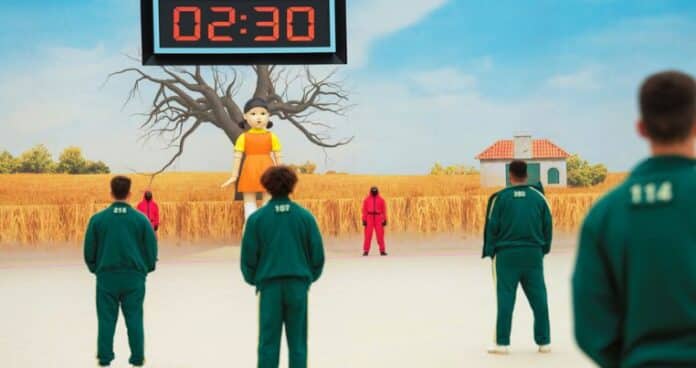The Netflix series “Squid Game” took the world by storm in 2021, capturing audiences with its captivating blend of survival drama and social commentary. The show’s success has spawned a real-life adaptation, “Squid Game: The Challenge,” a reality competition series that promises to bring the show’s thrilling challenges to life. However, without all the violence and gore of course.
Squid Game: The Challenge Brings Drama to Reality
At its core, “Squid Game: The Challenge” aims to replicate the essence of the original series, immersing 456 contestants in a series of games inspired by the show. However, there are some notable differences between the two. Unlike the fictionalized world of the TV series, where contestants face life-or-death consequences, “Squid Game: The Challenge” eliminates participants through monetary penalties, with a grand prize of 4.56 USD million.
While some games remain faithful to the TV show, others have been modified to accommodate a larger number of participants and ensure safety. For instance, the iconic “Red Light, Green Light” game uses sensors instead of lethal force. Still, the psychological toll on contestants is visibly significant, as they navigate the pressure of competition, the fear of elimination, and the potential for social manipulation.
Controversies Surrounding the Reality Show
The announcement of “Squid Game: The Challenge” sparked immediate debate, with concerns raised about the ethical implications of subjecting real people to intense psychological and emotional stress. Critics argue that the show exploits the popularity of the TV series without considering the potential harm it could cause contestants.
Psychologist Dr. Pamela Rutledge deems the show “ethically questionable,” arguing that it transforms the original series’ call to action against inequality into a spectacle where ruthlessness and lack of empathy are rewarded. The debate intensifies on whether viewers should feel culpable for indulging in a narrative that, in its real-life adaptation, may lose the satirical essence of its source material.
Critic Phil Harrison observes a shift from the drama’s acute satire of late capitalism to a real-life embodiment of the ruthlessness it once critiqued. The “last man standing” trope, emblematic of competitiveness in reality TV, takes center stage, prompting contemplation on societal values and the human desire for competition and success.
Additionally, some have questioned the show’s portrayal of human suffering for entertainment purposes. In one episode a man is shown crying and nauseating from the fact that his decision put his entire team in jeopardy. The original series was praised for its critique of societal issues like debt and poverty, but some fear that the reality show may trivialize these themes.
A Rollercoaster of Entertainment and Ethical Dilemma
Others suggest that viewers are drawn to Squid Game: The Challenge not out of sadism but due to a desire to be part of a cultural conversation. The show’s ability to go viral through word of mouth, coupled with the fear of missing out, underscores the societal need for shared experiences and cultural relevance.
While it mirrors the intense competition and moral dilemmas, it also introduces unexpected twists, making for highly compelling viewing. Despite lacking the lethal element of its fictional counterpart, this game proves that real people can be just as ruthless when a substantial cash prize is at stake. It leads them to schemes, strategic betrayals, and straining familial relationships, which raises ethical questions about the nature of entertainment.
Moreover, reports of contestants threatening legal action over alleged injuries add another layer of controversy, prompting scrutiny on the show’s commitment to contestant welfare. Producers emphasize that all contestants willingly participated and underwent suitability checks. The CEO of The Garden, John Hay, emphasizes the show’s duty of care, asserting that what viewers witness is the pressure of a game rather than disregard for contestants’ well-being. The creative director, Tim Harcourt, hints at moments of kindness and collaboration, challenging the assumption of cutthroat competition.


